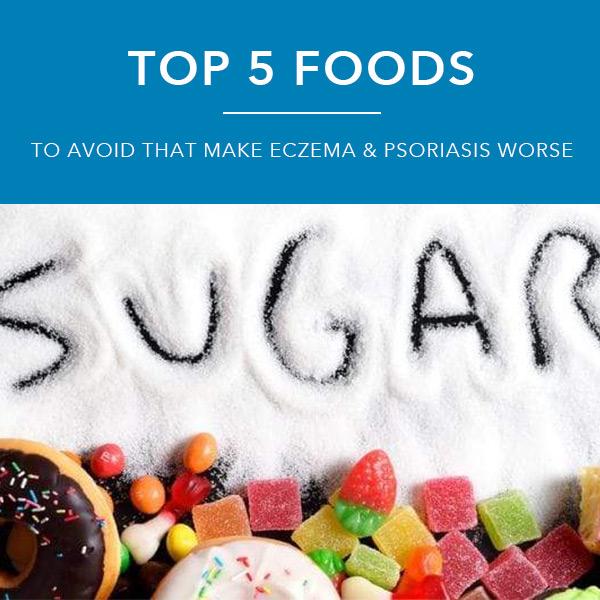
Top 5 foods to avoid with eczema & psoriasis
Share
Those of us who have personally experienced the effects of eczema or psoriasis will understand how relentless these skin conditions can be. While we often reach for a topical treatment that will provide relief, there are also ways to prevent or at least reduce the severity of your condition. It is well known that what you eat impacts your overall health, but did you know that it can also impact your skin? While symptoms vary from person to person, we’ve done our research and found the top five food groups to avoid for eczema and psoriasis.
1. Gluten

Gluten is a protein found in wheat and other grains. It is what provides elasticity to bread and helps it rise. In modern day grocery stores, gluten can be found in virtually every packaged and processed food like pasta, cereal, candy, sauces, soups and dressings to name a few. Unfortunately, roughly 1 in 70 Australians are allergic to gluten (otherwise known as celiac disease) and many more experience a gluten sensitivity. For eczema and psoriasis sufferers, around 25% experience an intolerance to gluten. This means, when gluten is consumed it can cause a flare up of your skin condition.
Testing and diagnosing celiac disease and gluten sensitivity can be a difficult and lengthy process, so many people go undiagnosed and are unaware of their own sensitivities. One simple way to determine how your body responds to gluten is to go gluten free for a while! Take note of how your body is feeling over the course of several weeks. If you’re feeling better without consuming gluten, there’s a pretty good chance you have a gluten intolerance or sensitivity.
You may find that you don’t need to entirely remove gluten from your diet. Listen to your body and decide for yourself. If you have strong symptoms, we recommend seeing a medical professional.
2. Dairy

Dairy is another known inflammatory food group that a large portion of adults have trouble digesting. Dairy products such as milk, yoghurt, cheese, ice cream and chocolate contain casein and lactose, which causes digestive issues for many people. Milk can also increase the amount of inflammatory cytokines in the body which can result in irritated and inflamed skin worsening and spreading across the body.
Dairy products can be a great source of protein and calcium, but there are alternate sources such as nuts and seeds, that are far healthier for you.
If you feel that you may have an intolerance or sensitivity to dairy products, try eliminating dairy for 6-8 weeks to see how your body responds. Again, if you find your skin irritation improves you may have a level of intolerance to dairy and it may be worth avoiding.
Remember, if your symptoms are quite severe, we recommend seeking professional medical advice.
3. Sugar

Whether refined or unrefined, brown or white, liquid or powdered, sugar is an insidious pro-inflammatory food. It provides no essential nutrients, it is high in fructose (which can cause liver problems and obesity) and it can cause insulin resistance as well as diabetes and a compromised immune system.
“But it tastes soooooo good!” you might exclaim.
We know! Of all of the foods on this list, sugar can be the hardest to consistently avoid.
When people consume sugar, they often notice a rush of anxiety, excitement and energy , followed by a crash with mild depressive symptoms and significant loss of enthusiasm. When you suffer from a skin condition such as eczema or psoriasis, you may even experience itchy breakouts and inflamed skin.
If like us, you have a major sweet tooth, never fear. We have found a tasty, natural substitute for refined sugar. Stevia. Stevia is a plant-based zero-calorie alternative sweetener that actually tastes 300 times sweeter than sugar. It is a viable solution for avoiding the negative implications of sugar, while satisfying your sweet tooth.
4. Nightshade foods

Fruits and vegetables from the nightshade family mare a likely staple for any family. These vegetables are incredibly good for you, however there are some people who believe this family of fruits and vegetables cause inflammation. Alkaloids and lectins are present in this vegetable family, which can increase inflammation and hurt your intestines, especially for those who already suffer from an immune-mediated disease.
Some of the vegetables in this food group include tomatoes, capsisums, white potatoes, eggplant, cayenne pepper and paprika. As you can imagine, it can be difficult to avoid them as they often are present in pizza and pasta sauces, stir fries, dips and fried snacks.
You can test your tolerance to these vegetables the same way you test with gluten or dairy. We recommend first eliminating gluten and dairy, and then if symptoms still persist you could try eliminating these foods from your diet.
5. Alcohol

Ok, so this is a hard one, too. We don’t expect everyone to stop drinking cold turkey because of their eczema or psoriasis, and the responsible enjoyment of alcohol in moderation can be good for your social, psychological (and physical) health.
Again, it comes down to listening to your body. Are there certain beverages that appear to cause inflammation and irritation? Do you find your skin is fine after one drink, but when you have three or more your symptoms worsen? Are you ok when you drink one day a week, but when you drink for multiple days consistently you feel the itch creeping in? Work out what your body can tolerate, and your skin will thank you.
Triggers will vary from person to person, so it’s important to learn what works for you. As a final note, avoiding these 5 foods is not a sure-fire cure: there are still a lot of variables that must be taken into account. We can also say with tremendous confidence that most people who suffer from this debilitating condition will see tangible benefits from following these dietary guidelines. Anything’s worth a try, right?
